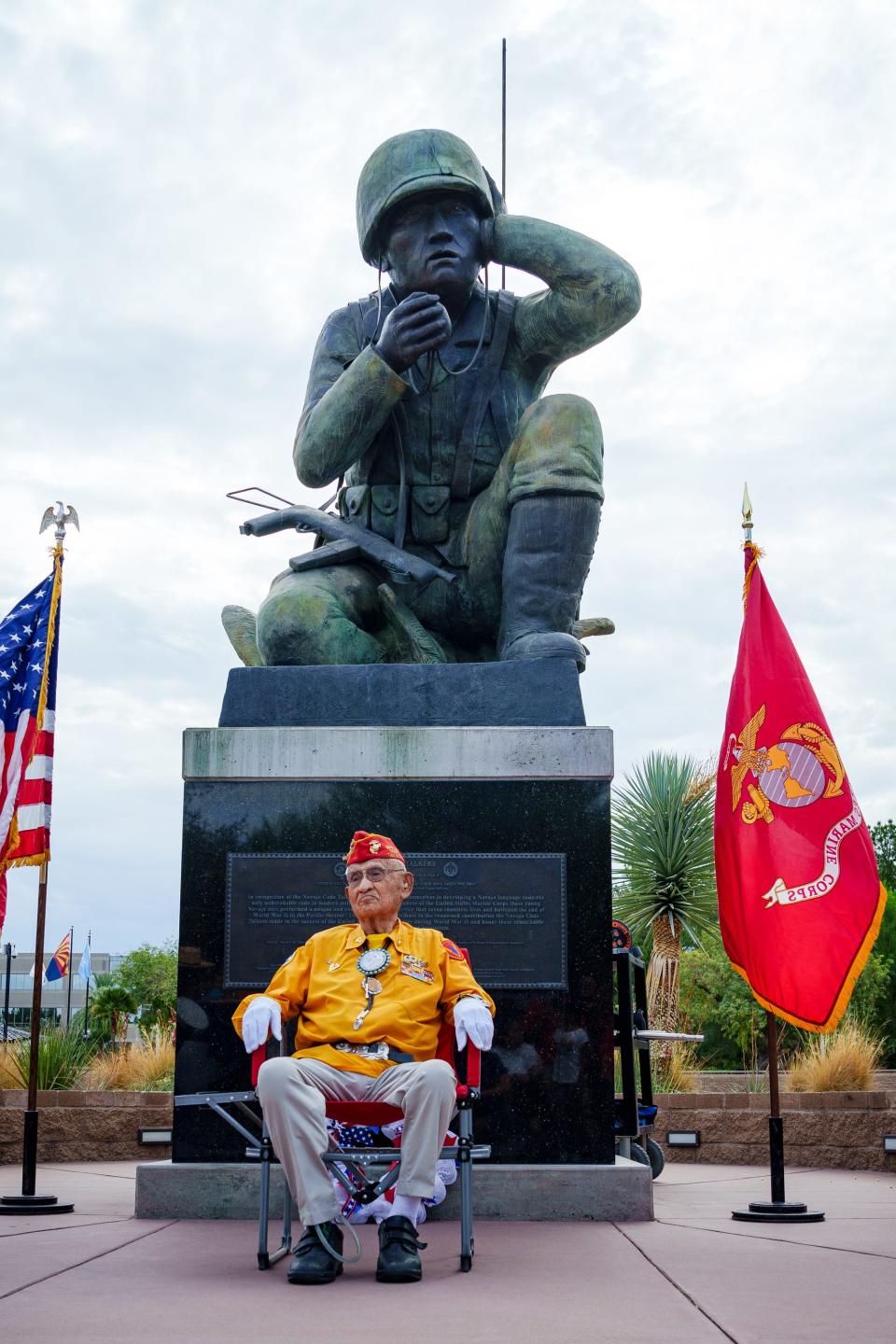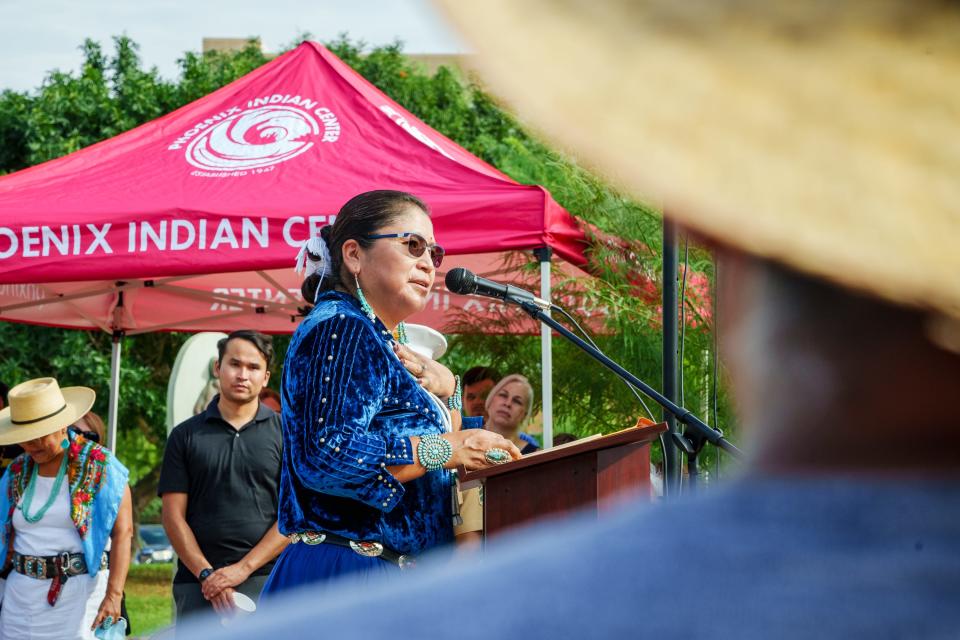'The unsung heroes of American history': Dozens gather at Arizona Capitol for Navajo Code Talkers Day
One of the last living Navajo Code Talkers, Thomas H. Begay, addressed dozens of community members at the Arizona Capitol Sunday morning.
"I want to thank you for showing us today... for remembering Navajo Code Talkers," said Begay in a speech on Sunday.
The event was held in honor of Navajo Code Talkers Day — established in 1983 by President Ronald Reagan — so it was befitting that the crowd gathered near the Navajo Code Talkers Memorial. The holiday is meant to recognize "all members of the Navajo Nation and to all Native Americans who gave their special talents and their lives so that others might live," according to the proclamation.
The Navajo Code Talkers participated in all assaults the U.S. Marines led in the Pacific from 1942 to 1945, including Guadalcanal, Tarawa, Peleliu and Iwo Jima. The Code Talkers conveyed messages by telephone and radio in their native language, a code that was never broken by the Japanese in World War II.
The event began at 8 a.m. with the posting of the colors by the Ira Hayes American Legion Post 84, followed by the National Anthem sung in Navajo and an opening prayer from Ronnie Towne, daughter of Arthur J. Hubbard who was a Navajo Code Talker and Arizona state senator.
"It is such a blessing to have Mr. Begay here," said Towne. "With so many bad things going on in the world today, we forget to remember the good things. So today when you leave, take the good stuff with you and pass it on."
According to the Library of Congress, Begay was born in a traditional Navajo hogan in a remote area near Two Wells, New Mexico, in 1927. The exact date of his birth was not recorded.
Begay served in the Pacific as a Navajo Code Talker during World War II from Aug. 12, 1944, to July 15, 1946, according to his discharge records.
"The Navajo Code Talkers originally had 29 original members and as the war progressed, more people continued to join and they were assigned to the unit at Camp Pendleton, California," said Arizona Senator Theresa Hatathlie. "As more code talkers were recruited, they came in and then they were sent out with their assignment. Many of them came home, many of them were wounded, many of them paid the ultimate price."
For 38 days, he was stationed on Iwo Jima. One of his treasured memories was seeing both American flags being raised on Feb. 23, 1945.
Begay also remembers being sent to Nagasaki a few weeks after the second atomic bomb hit on Aug. 9, 1945 and working as a radio operator.
After he was formally discharged from the military on July 23, 1946, Begay enlisted in the United States Army to be a paratrooper from July 22, 1947, to Aug. 1, 1953. He served as a parachutist, gliderman and in combat with the 7th Infantry Division during the Korean War.

In 2021, former Arizona Senator Jamesita Peshlakai sponsored a bill that was signed into law March 2021 by Gov. Doug Ducey that made National Navajo Code Talkers Day a legal state holiday every year on August 14 in Arizona.
"This is actually the very first official first annual Navajo Code Talkers Day in the state of Arizona," said Peshlakai.
Rebecca Fuller, great-granddaughter of Navajo Code Talker Samuel Jesse Smith Jr. says that she's happy that a date has been designated to celebrating the legacy and sacrifice of the Navajo Code Talkers.
"What brought me out here today was I just wanted to honor my great-grandfather Samuel Jesse Smith because my grandmother always tells me stories about how much he was a good man and I want to let everyone know that the Code Talkers helped out with World War II because it's not taught in schools," said Fuller.
Only three Navajo Code Talkers are still alive today: Peter MacDonald, John Kinsel Sr. and Thomas H. Begay.
Samuel Sandoval, a Navajo Code Talker, died last month at age 98.
"For all veterans going forward, let's continue to honor them, let's continue to listen to them and continue to have pride in them," said Hatathlie.

Fuller added that celebrating and having a day dedicated to the Navajo Code Talkers is important for the community.
"It's important to honor, especially people of color who fought and sacrificed themselves for our country," said Fuller.
The celebration ended with a closing prayer and many community members remained by the memorial to take photographs with Begay and socialize.
"It's definitely a long way coming," said Jovanni Allen, grandson of Navajo Code Talker Johnny R. Manuelito about Sunday's celebration. "These guys are truly the unsung heroes of American history because they were true to it in a time when the country didn't treat them or us any better because we weren't even citizens at that time, yet they still chose to defend the homeland."
More than 200 miles north of the state Capitol, dozens of people gathered in Flagstaff to listen to speakers share stories of their elders while celebrating the integral role they played throughout the history of American conflict.
About 50 miles from the Navajo Nation, Annabelle Smallcanyon, the granddaughter of Navajo Code Talker George P. Willie Sr., kicked off the event with a rendition of the national anthem and the Marine Corps hymn in Navajo before sharing the story of learning that her own father was a Code Talker.
Willie Sr. was so devoted to the oath he took to serve that he refused to even acknowledge his work as a Code Talker until his daughter told him the operation was finally declassified in 1968, Smallcanyon said.
A soft-spoken and humble man, Willie Sr. hardly spoke at all of his time in the Marine Corps, Smallcanyon said. Instead, she pieced together his history over the course of decades, taking note whenever something sparked a memory and prompted her father to share a story from his past.
Now, Smallcanyon is continuing to share her father's story as the rest of the country just begins to understand the incomparable influence that Indigenous service people have had in American conflicts stretching as far back as the Revolutionary War.
For centuries, Native Americans from tribes across the country have enlisted to serve in the military, many of whom continued to pass down the passion for military service through generations.
Willie Sr.'s son and grandson would eventually join the Marine Corps, further extending his legacy.
Ryan Benally, a Marine Corps veteran and Pat Tillman scholar, spoke to this calling as part of what it means to be Navajo and by extension Native.
"Native Americans serve in the armed forced five times the national average which puts us at a higher per capita of military involvement of any population and any demographic in United States military history," Benally said.
"These are incredible numbers that show why we're still a warrior culture that refused then and refuse now to lay down and die," he said.
Notably, every speaker in Flagstaff addressed the unique irony of the crucial role these Marines played while at the same time being direct products of widespread, generations-long disenfranchisement of Native populations at the hands of white settlers.
While these men were proving themselves to be indispensable in America's war effort, "At that same time in our nation's history, we had just gone under heavy policies of assimilation which were meant to strip away those elements of our culture, those very elements that saved the day," Benally said.
Reach breaking news reporter Haleigh Kochanski at hkochanski@arizonarepublic.com or on Twitter @HaleighKochans.
Shondiin Silversmith is a former reporter at The Arizona Republic.
Contact northern Arizona reporter Lacey Latch at llatch@gannett.com or on social media @laceylatch. Coverage of northern Arizona on azcentral.com and in The Arizona Republic is funded by the nonprofit Report for America and a grant from the Vitalyst Health Foundation in association with The Arizona Republic.
Support local journalism. Subscribe to azcentral.com today.
This article originally appeared on Arizona Republic: Dozens gather at Arizona Capitol for Navajo Code Talkers Day

